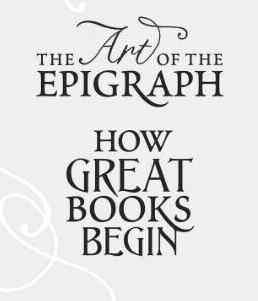 I love quotes. I collect them like some women collect shoes, only mine aren’t organized in a closet. They’re scattered everywhere: in notebooks and in e-files; cluttering my desk like bits of verbal confetti; on slips of paper in my coat pocket (my yoga teacher prints them out for us to take at the end of class.) I haven’t stencilled one on my living room wall yet, like a good friend of mine has, because then I’d have to pick a favorite.
I love quotes. I collect them like some women collect shoes, only mine aren’t organized in a closet. They’re scattered everywhere: in notebooks and in e-files; cluttering my desk like bits of verbal confetti; on slips of paper in my coat pocket (my yoga teacher prints them out for us to take at the end of class.) I haven’t stencilled one on my living room wall yet, like a good friend of mine has, because then I’d have to pick a favorite.
I love quotes so much I post one a week on my Facebook author page, and, like many other writers, I generally pick one to start every novel I write. I’ve done it for years.
Last week I received an email from Penguin Publishing. “Had I,” the editor asked, “Obtained permission for the epigraph I’d selected for The Art of Getting Stared At?” The epigraph in question reads: We should not feel embarrassed by our difficulties, only by our failure to grow anything beautiful from them. Alain de Botton.
“I didn’t know I needed to,” I responded. I assumed the short quote fell under the terms of fair use.
I assumed wrong.
Okay, not completely, unequivocally wrong, but potentially wrong if the epigraph was ever questioned. And publishers run from the phrase ‘if it’s ever questioned’ like a cat running from hot water. In fact, the issue of using epigraphs is an extremely grey area. And publishers don’t like grey either (unless it pertains to shades thereof, and they’re the one responsible for publishing the shades thereof book).
Basically, as the Penguin editor explained it to me, they treat each epigraph on a case-by-case basis because there are so many variables (writer/editor Jane Friedman has written an excellent, more detailed, blog on this: http://janefriedman.com/2012/01/23/permissions/)
In my case, I was asked to contact Mr. de Botton and request permission to use his quote. De Botton is an extremely successful writer (Status Anxiety; The Pleasures and Sorrows of Work are two of his many titles), philosopher, and TV presenter. My anxiety around the pleasures and sorrows of my own work started to ratchet up. Would my email hit his spam folder? Be set aside by a publicist or a gatekeeper? What if my request was passed to his publisher? What if de Botton simply didn’t get back to me? All legitimate concerns and given the fact that I had a deadline, I was a little concerned.
But I wouldn’t know until I tried, so I fired off an email. Less than thirty minutes later, I had an answer from de Botton himself (and he lives in the UK so it was early evening when he received my note which made the quick turnaround all the more remarkable).
“I would be delighted,” he said. “How very kind.”
Not only did my anxiety float off like a dandelion seed on the wind, I was left feeling that I had done Mr. de Botton a favor, when, in fact, the opposite was true. He was being extraordinarily gracious and generous to me.
Thank you, Mr. de Botton. Your response was a reminder to be grateful, something you’ve spoken about before.
“Rather than getting more spoilt with age, as difficulties pile up, epiphanies of gratitude abound.” Alain de Botton.

Comments